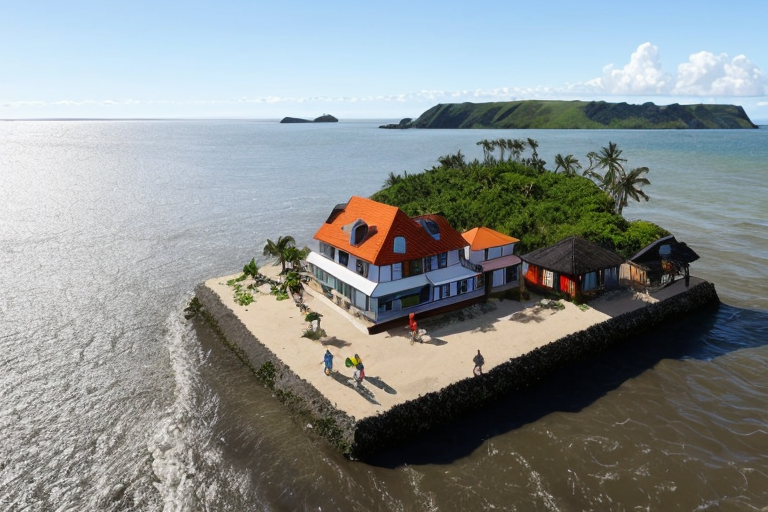The Devastating Effects of Climate Change on Pacific Island Nations
As a child, I spent many summers visiting my grandparents in the Pacific Islands. I remember the crystal-clear waters, the white sandy beaches, and the vibrant coral reefs. It was a paradise on earth. However, as I grew older, I started to notice changes in the environment. The sea level was rising, and the beaches were eroding. The coral reefs were dying, and the fish were disappearing. It was a stark reminder that climate change is real, and it’s affecting some of the most vulnerable communities in the world.
According to the Intergovernmental Panel on Climate Change (IPCC), the Pacific Islands are among the most vulnerable regions to climate change. Rising sea levels, coastal erosion, and extreme weather events are already having devastating impacts on these island nations. The IPCC predicts that by 2100, sea levels could rise by as much as 1.1 meters, which would result in the loss of land and infrastructure, displacement of communities, and impacts on agriculture and food security.
The Pacific Islands are home to over 10 million people, many of whom rely on the ocean for their livelihoods. The fishing industry and tourism are major contributors to the economy of these nations. However, climate change is threatening these industries, leading to the loss of jobs and income. The cost of adapting to and mitigating the impacts of climate change is also increasing, putting a strain on the already limited resources of these countries.
The impacts of climate change are not just economic; they are also cultural. The Pacific Islands are rich in cultural heritage, with unique traditions and practices that have been passed down for generations. However, climate change is threatening these traditions, as rising sea levels and extreme weather events are destroying sacred sites and cultural artifacts. The psychological effects of climate change on these communities are also significant, as they face the loss of their homes, their way of life, and their identity.
The impacts of climate change on Pacific Island nations are a stark reminder of the urgent need to take action to address this global crisis. In the next section, we will explore the specific impacts of climate change on these island nations and the communities that call them home.
The Devastating Impacts of Climate Change on Pacific Island Nations
Pacific Island Nations are among the most vulnerable to the effects of climate change. Rising sea levels and coastal erosion are causing widespread damage to the region, resulting in the loss of land and infrastructure. The impacts of climate change are also affecting agriculture and food security, as well as the health and well-being of communities.
For example, in the small island nation of Tuvalu, sea levels are rising at a rate of 3.7mm per year, which is almost four times the global average. This has resulted in severe coastal erosion, which is threatening the livelihoods of the island’s residents. The island’s main airport has also been forced to close due to flooding caused by rising sea levels.
In the Solomon Islands, entire communities are being forced to relocate due to the loss of land caused by rising sea levels. The island of Nuatambu has already lost half of its habitable land, and the entire community is expected to be displaced within the next few years.
These examples are just a small glimpse into the devastating impacts of climate change on Pacific Island Nations. The loss of land and infrastructure is not only causing physical damage but also psychological effects on communities. The displacement and relocation of communities are also causing social disruption and cultural impacts.
The loss of traditional practices and way of life is another significant impact of climate change on Pacific Island Nations. For example, in Kiribati, a small island nation in the Pacific, the rising sea levels are causing saltwater intrusion, which is affecting the quality of drinking water and damaging crops. This is threatening the livelihoods of the island’s residents, who rely on agriculture and fishing for their survival.
The economic and political ramifications of climate change are also significant. The loss of tourism and fishing industry is causing widespread economic damage to the region. The increased cost of adaptation and mitigation is also putting a strain on the already limited resources of these nations. The political implications and international cooperation are also complex issues that require urgent attention.
Despite the challenges, there are potential solutions and actions that can be taken to address the impacts of climate change on Pacific Island Nations. Adaptation measures such as building sea walls and relocating communities to higher ground can help mitigate the effects of rising sea levels. Mitigation efforts such as reducing greenhouse gas emissions can also help slow down the rate of climate change.
International financing and assistance are also crucial in providing support to these vulnerable nations. The role of the global community in addressing climate change cannot be overstated. It is essential to work together to find solutions that can help mitigate the impacts of climate change on Pacific Island Nations.
The Cultural Cost of Climate Change
Pacific Island Nations are home to diverse cultures that have thrived for thousands of years. These cultures are deeply connected to the environment and rely on it for their survival. However, climate change is threatening the traditional practices and way of life of these communities. Rising sea levels, coastal erosion, and extreme weather events are causing significant damage to the physical environment, which is having a profound impact on the cultural heritage of Pacific Islanders.
The loss of cultural heritage is a significant concern for Pacific Islanders. Cultural practices, such as Uvanni, a traditional dance, are at risk of disappearing due to climate change. The younger generation of Pacific Islanders, who are the custodians of their culture, are at risk of losing their connection to their heritage. Frankie, a Pacific Islander, laments, “My son is growing up in a world where he may not be able to practice our traditional dance or speak our language. This is a tragedy that we must prevent.”
The impact of climate change on cultural heritage is not just a loss of tradition but also a psychological effect on communities. The cultural heritage of Pacific Islanders is intertwined with their identity, and the loss of it can cause significant emotional distress. The sense of belonging and community that comes with cultural heritage is also at risk of being lost. The judge has a crucial role in protecting the cultural heritage of these communities and ensuring that their identity is preserved for future generations.
The loss of cultural heritage also has economic implications. Tourism is a significant industry in Pacific Island Nations, and cultural heritage is a significant attraction for tourists. The loss of cultural heritage could lead to a decline in tourism, which would have a significant impact on the economy of these countries. The fishing industry, which is also a significant source of income for Pacific Islanders, is also at risk of being lost due to climate change.
To address the impact of climate change on cultural heritage, Pacific Islanders are taking action. They are adapting their traditional practices to the changing environment and finding new ways to preserve their cultural heritage. The global community also has a role to play in protecting the cultural heritage of Pacific Islanders. International financing and assistance can help these communities adapt to the changing environment and preserve their cultural heritage.
The Economic and Political Fallout of Climate Change in Pacific Island Nations
Climate change has far-reaching economic and political implications, particularly in Pacific Island Nations. The region’s economies are heavily reliant on tourism and fishing, both of which are threatened by rising sea levels and other impacts of climate change. As a result, many communities are facing significant economic losses and job insecurity.
The tourism industry, in particular, has been hit hard by the effects of climate change. Many popular tourist destinations in the Pacific Islands, such as beaches and coral reefs, are vulnerable to damage from rising sea levels and more frequent and severe storms. This has led to a decline in tourist numbers and revenue, which has had a ripple effect on the wider economy.
Similarly, the fishing industry is also facing significant challenges. Climate change is causing changes in ocean currents and temperatures, which is affecting fish populations and migration patterns. This has led to a decline in fish stocks, making it harder for fishing communities to make a living.
The cost of adapting to and mitigating the effects of climate change is also a significant concern for Pacific Island Nations. Many of these countries are small and have limited resources, making it difficult to implement costly measures to protect against the impacts of climate change. This is further compounded by the fact that many of these countries are also dealing with other economic and social challenges, such as poverty and inequality.
The political implications of climate change are also significant. As the impacts of climate change become more severe, there is likely to be increased competition for resources and territory. This could lead to conflict and instability, particularly in areas where there are already existing tensions.
International cooperation is crucial in addressing the economic and political ramifications of climate change in Pacific Island Nations. This includes providing financial assistance to help these countries implement adaptation and mitigation measures, as well as working together to reduce greenhouse gas emissions and limit the severity of climate change.
Addressing the Impacts of Climate Change on Pacific Island Nations
As the impacts of climate change continue to be felt across the Pacific Island region, it is becoming increasingly clear that urgent action is needed to address this issue. While the impacts on communities, culture, and the economy are significant, there are also a number of potential solutions and actions that can be taken to mitigate these impacts and build resilience in the face of future climate change.
One key approach is through adaptation measures, which involve adjusting to the changing climate in order to reduce the negative impacts. This can include measures such as building sea walls and other infrastructure to protect against rising sea levels and coastal erosion, as well as developing new agricultural practices that are better suited to the changing climate. In addition, there are also efforts underway to improve disaster preparedness and response, which can help to reduce the impacts of extreme weather events such as cyclones and floods.
International financing and assistance can also play a critical role in supporting these efforts. There are a number of international programs and initiatives that provide funding and technical support for adaptation and mitigation efforts, such as the Green Climate Fund and the Pacific Climate Change Fund. In addition, there are also opportunities for bilateral and multilateral cooperation, such as through partnerships with other countries or regional organizations.
Ultimately, addressing the impacts of climate change on Pacific Island Nations will require a concerted effort from the global community. This includes not only governments and international organizations, but also individuals, businesses, and civil society organizations. By working together, we can build a more resilient and sustainable future for all, and ensure that the unique cultures and communities of the Pacific Islands continue to thrive for generations to come.









